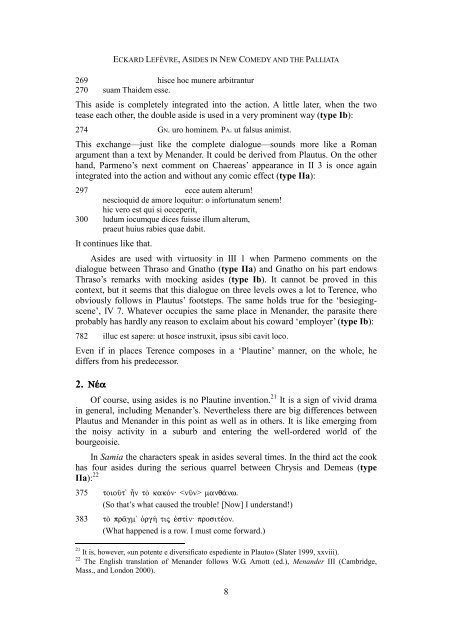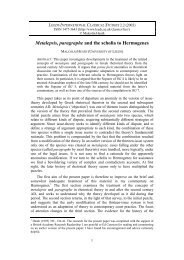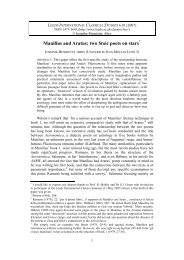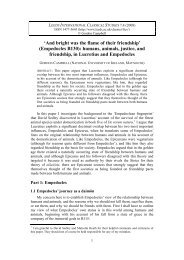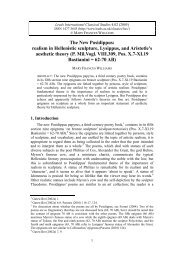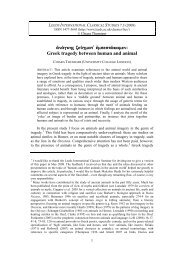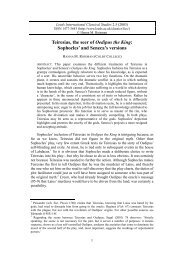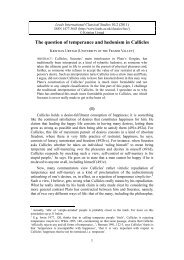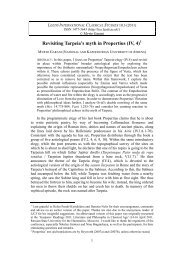Asides in New Comedy and the Palliata - Leeds International ...
Asides in New Comedy and the Palliata - Leeds International ...
Asides in New Comedy and the Palliata - Leeds International ...
You also want an ePaper? Increase the reach of your titles
YUMPU automatically turns print PDFs into web optimized ePapers that Google loves.
ECKARD LEFÈVRE, ASIDES IN NEW COMEDY AND THE PALLIATA<br />
269 hisce hoc munere arbitrantur<br />
270 suam Thaidem esse.<br />
This aside is completely <strong>in</strong>tegrated <strong>in</strong>to <strong>the</strong> action. A little later, when <strong>the</strong> two<br />
tease each o<strong>the</strong>r, <strong>the</strong> double aside is used <strong>in</strong> a very prom<strong>in</strong>ent way (type Ib):<br />
274 GN. uro hom<strong>in</strong>em. PA. ut falsus animist.<br />
This exchange—just like <strong>the</strong> complete dialogue—sounds more like a Roman<br />
argument than a text by Men<strong>and</strong>er. It could be derived from Plautus. On <strong>the</strong> o<strong>the</strong>r<br />
h<strong>and</strong>, Parmeno’s next comment on Chaereas’ appearance <strong>in</strong> II 3 is once aga<strong>in</strong><br />
<strong>in</strong>tegrated <strong>in</strong>to <strong>the</strong> action <strong>and</strong> without any comic effect (type IIa):<br />
297 ecce autem alterum!<br />
nescioquid de amore loquitur: o <strong>in</strong>fortunatum senem!<br />
hic vero est qui si occeperit,<br />
300 ludum iocumque dices fuisse illum alterum,<br />
praeut huius rabies quae dabit.<br />
It cont<strong>in</strong>ues like that.<br />
<strong>Asides</strong> are used with virtuosity <strong>in</strong> III 1 when Parmeno comments on <strong>the</strong><br />
dialogue between Thraso <strong>and</strong> Gnatho (type IIa) <strong>and</strong> Gnatho on his part endows<br />
Thraso’s remarks with mock<strong>in</strong>g asides (type Ib). It cannot be proved <strong>in</strong> this<br />
context, but it seems that this dialogue on three levels owes a lot to Terence, who<br />
obviously follows <strong>in</strong> Plautus’ footsteps. The same holds true for <strong>the</strong> ‘besieg<strong>in</strong>gscene’,<br />
IV 7. Whatever occupies <strong>the</strong> same place <strong>in</strong> Men<strong>and</strong>er, <strong>the</strong> parasite <strong>the</strong>re<br />
probably has hardly any reason to exclaim about his coward ‘employer’ (type Ib):<br />
782 illuc est sapere: ut hosce <strong>in</strong>struxit, ipsus sibi cavit loco.<br />
Even if <strong>in</strong> places Terence composes <strong>in</strong> a ‘Plaut<strong>in</strong>e’ manner, on <strong>the</strong> whole, he<br />
differs from his predecessor.<br />
2. Nša<br />
Of course, us<strong>in</strong>g asides is no Plaut<strong>in</strong>e <strong>in</strong>vention. 21 It is a sign of vivid drama<br />
<strong>in</strong> general, <strong>in</strong>clud<strong>in</strong>g Men<strong>and</strong>er’s. Never<strong>the</strong>less <strong>the</strong>re are big differences between<br />
Plautus <strong>and</strong> Men<strong>and</strong>er <strong>in</strong> this po<strong>in</strong>t as well as <strong>in</strong> o<strong>the</strong>rs. It is like emerg<strong>in</strong>g from<br />
<strong>the</strong> noisy activity <strong>in</strong> a suburb <strong>and</strong> enter<strong>in</strong>g <strong>the</strong> well-ordered world of <strong>the</strong><br />
bourgeoisie.<br />
In Samia <strong>the</strong> characters speak <strong>in</strong> asides several times. In <strong>the</strong> third act <strong>the</strong> cook<br />
has four asides dur<strong>in</strong>g <strong>the</strong> serious quarrel between Chrysis <strong>and</strong> Demeas (type<br />
IIa): 22<br />
375 toioàt' Ãn tÕ kakÒn: manq£nw.<br />
(So that’s what caused <strong>the</strong> trouble! [Now] I underst<strong>and</strong>!)<br />
383 tÕ pr©gm' Ñrg» tij st…n: prositšon.<br />
(What happened is a row. I must come forward.)<br />
21 It is, however, «un potente e diversificato espediente <strong>in</strong> Plauto» (Slater 1999, xxviii).<br />
22 The English translation of Men<strong>and</strong>er follows W.G. Arnott (ed.), Men<strong>and</strong>er III (Cambridge,<br />
Mass., <strong>and</strong> London 2000).<br />
8


